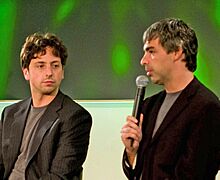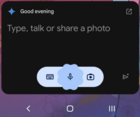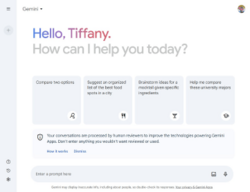Gemini (chatbot) facts for kids
 |
|
| Developer(s) | Google DeepMind Google AI |
|---|---|
| Initial release | March 21, 2023 |
| Stable release |
May 21, 2024
|
| Operating system | |
| Predecessor | Google Assistant PaLM |
| Available in | 46 languages 239 countries and regions |
| Type | Chatbot |
| License | Proprietary |
Gemini, formerly known as Bard, is a generative artificial intelligence chatbot developed by Google. Based on the large language model (LLM) of the same name and developed as a direct response to the rise of OpenAI's ChatGPT, it was launched in a limited capacity in March 2023 before expanding to other countries in May. It was previously based on PaLM, and initially the LaMDA family of large language models.
LaMDA had been developed and announced in 2021, but it was not released to the public out of an abundance of caution. OpenAI's launch of ChatGPT in November 2022 and its subsequent popularity caught Google executives off-guard and sent them into a panic, prompting a sweeping response in the ensuing months. After mobilizing its workforce, the company launched Bard in February 2023, which took center stage during the 2023 Google I/O keynote in May and was upgraded to the Gemini LLM in December. Bard and Duet AI were unified under the Gemini brand in February 2024, coinciding with the launch of an Android app, which would replace Google Assistant as the main virtual assistant on Android, Google Assistant, however, will stay as an optional assistant.
Gemini has received lukewarm responses. It became the center of controversy in February 2024, when social media users reported that it was generating historically inaccurate images of historical figures as people of color, with conservative commentators decrying its alleged bias as "wokeness".
Contents
Background

In November 2022, OpenAI launched ChatGPT, a chatbot based on the GPT-3 family of large language models (LLMs). ChatGPT gained worldwide attention following its release, becoming a viral Internet sensation. Alarmed by ChatGPT's potential threat to Google Search, Google executives issued a "code red" alert, reassigning several teams to assist in the company's artificial intelligence (AI) efforts. Sundar Pichai, the CEO of Google and parent company Alphabet, was widely reported to have issued the alert, but Pichai later denied this to The New York Times. In a rare move, Google co-founders Larry Page and Sergey Brin, who had stepped down from their roles as co-CEOs of Alphabet in 2019, were summoned to emergency meetings with company executives to discuss Google's response to ChatGPT. Brin requested access to Google's code in February 2023, for the first time in years.
Earlier in 2021, the company had unveiled LaMDA, a prototype LLM, but did not release it to the public. When asked by employees at an all-hands meeting whether LaMDA was a missed opportunity for Google to compete with ChatGPT, Pichai and Google AI chief Jeff Dean stated that while the company had similar capabilities to ChatGPT, moving too quickly in that arena would represent a major "reputational risk" due to Google being substantially larger than OpenAI. In January 2023, Google sister company DeepMind CEO Demis Hassabis hinted at plans for a ChatGPT rival, and Google employees were instructed to accelerate progress on a ChatGPT competitor, intensively testing "Apprentice Bard" and other chatbots. Pichai assured investors during Google's quarterly earnings investor call in February that the company had plans to expand LaMDA's availability and applications.
History
Announcement
On February 6, 2023, Google announced Bard, a generative artificial intelligence chatbot powered by LaMDA. Bard was first rolled out to a select group of 10,000 "trusted testers", before a wide release scheduled at the end of the month. The project was overseen by product lead Jack Krawczyk, who described the product as a "collaborative AI service" rather than a search engine, while Pichai detailed how Bard would be integrated into Google Search. Reuters calculated that adding ChatGPT-like features to Google Search could cost the company $6 billion in additional expenses by 2024, while research and consulting firm SemiAnalysis calculated that it would cost Google $3 billion. The technology was developed under the codename "Atlas", with the name "Bard" in reference to the Celtic term for a storyteller and chosen to "reflect the creative nature of the algorithm underneath".
Multiple media outlets and financial analysts described Google as "rushing" Bard's announcement to preempt rival Microsoft's planned February 7 event unveiling its partnership with OpenAI to integrate ChatGPT into its Bing search engine in the form of Bing Chat (later rebranded as Microsoft Copilot), as well as to avoid playing "catch-up" to Microsoft. Microsoft CEO Satya Nadella told The Verge: "I want people to know that we made them dance." Tom Warren of The Verge and Davey Alba of Bloomberg News noted that this marked the beginning of another clash between the two Big Tech companies over "the future of search", after their six-year "truce" expired in 2021; Chris Stokel-Walker of The Guardian, Sara Morrison of Recode, and analyst Dan Ives of investment firm Wedbush Securities labeled this an AI arms race between the two.
After an "underwhelming" February 8 livestream in Paris showcasing Bard, Google's stock fell eight percent, equivalent to a $100 billion loss in market value, and the YouTube video of the livestream was made private. Many viewers also pointed out an error during the demo in which Bard gives inaccurate information about the James Webb Space Telescope in response to a query. Google employees criticized Pichai's "rushed" and "botched" announcement of Bard on Memgen, the company's internal forum, while Maggie Harrison of Futurism called the rollout "chaos". Pichai defended his actions by saying that Google had been "deeply working on AI for a long time", rejecting the notion that Bard's launch was a knee-jerk reaction. Alphabet chairman John Hennessy acknowledged that Bard was not fully product-ready, but expressed excitement at the technology's potential.
A week after the Paris livestream, Pichai asked employees to dedicate two to four hours to dogfood testing Bard, while Google executive Prabhakar Raghavan encouraged employees to correct any errors Bard makes. 80,000 employees responded to Pichai's call to action. In the following weeks, Google employees roundly criticized Bard in internal messages, citing a variety of safety and ethical concerns and calling on company leaders not to launch the service. Seeking to prioritize keeping up with competitors, Google executives decided to proceed with the launch anyway, overruling an unsympathetic risk assessment report conducted by its AI ethics team. After Pichai suddenly laid off 12,000 employees later that month due to slowing revenue growth, remaining workers shared memes and snippets of their humorous exchanges with Bard soliciting its "opinion" on the layoffs. Google employees began testing a more sophisticated version of Bard with larger parameters, dubbed "Big Bard", in mid-March.
Launch
Google opened up early access for Bard on March 21, 2023, in a limited capacity, allowing users in the U.S. and UK to join a waitlist. Unlike Microsoft's approach with Bing Chat, Bard was launched as a standalone web application featuring a text box and a disclaimer that the chatbot "may display inaccurate or offensive information that doesn't represent Google's views". Three responses are then provided to each question, with users prompted to submit feedback on the usefulness of each answer. Google vice presidents Sissie Hsiao and Eli Collins framed Bard as a complement to Google Search and stated that the company had not determined how to make the service profitable. Among those granted early access were those enrolled in Google's "Pixel Superfans" loyalty program, users of its Pixel and Nest devices, and Google One subscribers.
Bard is trained by third-party contractors hired by Google, including Appen and Accenture workers, whom Business Insider and Bloomberg News reported were placed under extreme pressure, overworked, and underpaid. Bard is also trained on data from publicly available sources, which Google disclosed by amending its privacy policy. Shortly after Bard's initial launch, Google reorganized the team behind Google Assistant, the company's virtual assistant, to focus on Bard instead. Google researcher Jacob Devlin resigned from the company after claiming that Bard had surreptitiously leveraged data from ChatGPT; Google denied the allegations. Meanwhile, a senior software engineer at the company published an internal memo warning that Google was falling behind in the AI "arms race", not to OpenAI but to independent researchers in open-source communities. Pichai revealed on March 31 that the company intended to "upgrade" Bard by basing it on PaLM, a newer and more powerful LLM from Google, rather than LaMDA. The same day, Krawczyk announced that Google had added "math and logic capabilities" to Bard. Bard gained the ability to assist in coding in April, being compatible with more than 20 programming languages at launch. Microsoft also began running advertisements in the address bar of a developer build of the Edge browser, urging users to try Bing whenever they visit the Bard web app. Google is working to integrate Bard into its ChromeOS operating system and Pixel devices.
Updates
Bard took center stage during the annual Google I/O keynote in May 2023, with Pichai and Hsiao announcing a series of updates to Bard, including the adoption of PaLM 2, integration with other Google products and third-party services, expansion to 180 countries, support for additional languages, and new features. In stark contrast to previous years, the Assistant was barely mentioned during the event. The expanded rollout did not include any nations in the European Union (EU), possibly reflecting concerns about compliance with the General Data Protection Regulation. Those with Google Workspace accounts also gained access to the service. Google attempted to launch Bard in the EU in June but was blocked by the Irish Data Protection Commission, who requested a "data protection impact assessment" from the company. In July, Google launched Bard in the EU and Brazil, added support for dozens of new languages, and introduced multiple new personalization and productivity features. An invite-only chatroom ("server") on Discord was created in July, consisting of users who heavily use Bard. Over the next few months, the chatroom was flooded with comments questioning the usefulness of Bard.
Reflecting on Bard's launch in an interview with Wired in September, Pichai acknowledged that Google had been "cautious" to release LaMDA because of "the responsibility that comes with getting it right", complimenting OpenAI for ChatGPT's launch and firing back at Nadella's comment about making Google dance. Google released a major update to the chatbot later that month, integrating it into many of its products through "extensions", adding a button to fact-check AI-generated responses through Google Search, and allowing users to share conversation threads. Google also introduced the "Google-Extended" web crawler as part of its search engine's robots.txt indexing file to allow web publishers to opt-out of allowing Bard to scan them for training. Online users later discovered that Google Search was indexing Bard conversation threads on which users had enabled sharing. Google stated that this was an error and quickly moved to rectify the leaks.
In October, during the company's annual Made by Google event in which it announced the Pixel 8 series and the Pixel Watch 2, Hsiao unveiled "Assistant with Bard", an upgraded version of the Google Assistant which was deeply integrated with Bard, following in the footsteps of Amazon's approach with Alexa. When the U.S. Copyright Office solicited public comment on potential new regulation on generative AI technologies, Google joined with OpenAI and Microsoft in arguing that the responsibility for generating copyrighted material lay with the user, not the developer. Accenture contractors voted to join the Alphabet Workers Union in November, in protest of suboptimal working conditions, while the company filed a lawsuit in the U.S. District Court for the Northern District of California against a group of unidentified scammers who had been advertising malware disguised as a downloadable version of Bard.
Relaunch

On December 6, 2023, Google announced Gemini, a multimodal and more powerful LLM touted as the company's "largest and most capable AI model". A specially tuned version of the mid-tier Gemini Pro was integrated into Bard, while the larger Gemini Ultra was set to power "Bard Advanced" in 2024. The Wall Street Journal reported that Bard was then averaging around 220 million monthly visitors. Google ended its contract with Appen in January 2024, while Bard gained the long-awaited ability to generate images the next month, powered by Google Brain's Imagen 2 text-to-image model.
On February 8, 2024, Bard and Duet AI were unified under the Gemini brand, with a mobile app launched on Android and the service integrated into the Google app on iOS. On Android, users who downloaded the app saw Gemini replace Assistant as their device's default virtual assistant, though Assistant remained a standalone service. Google also launched "Gemini Advanced with Ultra 1.0", available via a "Google One AI Premium" subscription, incorporated Gemini into its Messages app on Android, and announced a partnership with Stack Overflow.
Gemini once again took center stage at the 2024 Google I/O keynote, with traditionally emphasized topics such as Android 15 and the Pixel 8a relegated to separate events the next day and prior week, respectively. Google announced Gemini integrations into a variety of products, including Android, Chrome, Photos, and Workspace. The Washington Post described the presentation as a "tsunami of new AI features". Gemini Advanced was upgraded to the "Gemini 1.5 Pro" language model, with Google previewing Gemini Live, a voice chat mode, and Gems, the ability to create custom chatbots.
On June 5, 2024, Gemini's Android app was expanded to Europe and more Google Assistant and original features are set to be added to the app, such as Spotify support and setting timers and reminders. The Gemini app became available on Google's Android operating system, with plans for iOS users to access it through the existing Google app. This launch aimed to expand Gemini's user base, allowing interactions via text, voice, and images.



